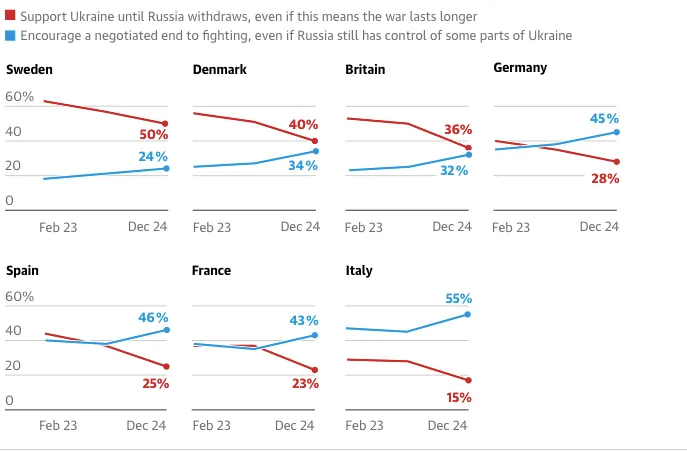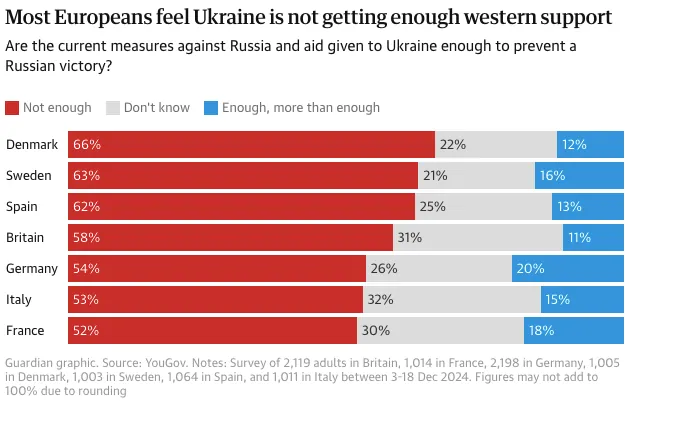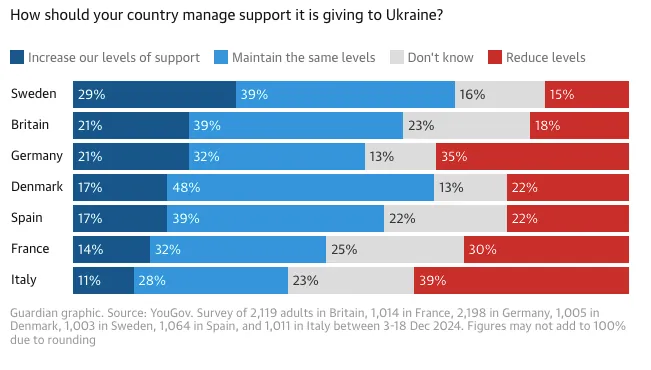Seven Western European countries have seen a sharp drop in support for Ukraine in its war against Russian aggression. Polls show that most Europeans now favor peace talks, even if it means Russia giving up control of parts of Ukrainian territory.
A December YouGov poll in France, Germany, Italy, Spain, Sweden, Denmark and the UK found that public willingness to support Ukraine until victory – even if it means continuing the war – has fallen in all seven countries over the past 12 months.
Support for a negotiated end to the fighting, even if it leaves Russia in control of part of Ukraine, has increased in every country, with the poll showing that this option was the most preferred in four countries.

The poll showed that willingness to support Ukraine in defeating Russia remains high in Sweden (50%) and Denmark (40%), and in the UK – 36%, but these figures have decreased by 14 points compared to January's figures of 57%, 51% and 50%.
Over the same period, the percentage of respondents who favor a negotiated peace rose to 55% from 45% in Italy, 46% (38%) in Spain, 43% (35%) in France, and 45% (38%) in Germany, accompanied by a corresponding decline in willingness to support Ukraine to victory.
It is unclear whether this shift reflects a decline in interest or a rise in fatigue. In France, Germany, and Sweden, the share of those who want and care about Ukraine’s victory has remained stable since early 2023, although it has declined in other countries.


Less than a month after Trump's return, a majority or near majority of those surveyed in all but one country believe that the US president-elect will most likely end support for Ukraine: 62% of Germans, 60% of Spaniards, 56% of Britons, 52% of French, and 48% of Italians.
Those surveyed were less confident that Trump would withdraw the United States from the NATO defense alliance: Danes, Germans, Italians, Spaniards, and Swedes believe that this will not happen, while the opinions of the British and French were evenly divided.
People are also divided on how they would feel about a peace settlement that would leave Russia in control of at least some parts of Ukraine it illegally seized after its invasion in February 2022, as Trump reportedly plans.
Majorities in Sweden (57%), Denmark (53%) and the UK (51%), as well as a significant minority (43%) in Spain, said they would have a very or fairly negative view of such an agreement, compared with 37% in France and 31% in Germany and Italy.
The poll showed that most Western Europeans believe that Ukraine's allies have not done enough, both in terms of economic sanctions against Moscow and in terms of military and other assistance to Kyiv.
Some 66% of Danes, 63% of Swedes and Spaniards, 59% of Britons, 53% of Germans and Italians and 52% of French said that overall aid to Ukraine was either not at all or not nearly enough. However, only a few believe that their country should increase its support.
A minority – from 29% in Sweden, 21% in the UK and Germany, 14% in France and just 11% in Italy – believe their government should increase aid to Ukraine, with a majority in each country saying aid should either be maintained or reduced.
When it comes to specific measures, such as tightening sanctions, supplying more weapons, sending additional troops to support NATO members in Eastern Europe, or coordinating airstrikes on Russian targets in Ukraine, their support remained unchanged or was lower than before.
When asked what they think the situation will be like in a year, few Western Europeans believe that Russia or Ukraine will win; most believe that the two countries will either still be at war or negotiating peace.
Residents of Denmark (47%), Germany (40%), the United Kingdom and France (38%), and Italy (36%) consider the end of the war to be more likely, while residents of Spain (36%) and Sweden (35%) consider the continuation of hostilities to be a somewhat more likely scenario.

